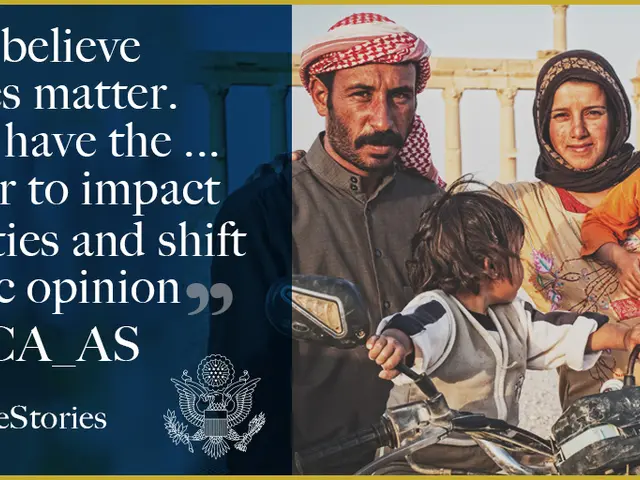World humanitarian organizations claim that Israel is inducting Gaza into a state of malnutrition
The ceasefire talks between Israel and Hamas in the Gaza Strip have hit a roadblock, with negotiations stalled due to unacceptable demands from Hamas and a breakdown in trust, leading to the withdrawal of the U.S. negotiating team.
The latest impasse in the talks revolves around Hamas's demands for a full Israeli withdrawal from the Gaza Strip, an end to the war, and further concessions such as increased release of security prisoners per hostage freed and guarantees from mediators. These demands have been viewed as obstructive by Israel and the U.S.
U.S. special envoy Steve Witkoff stated that Hamas appeared disorganized and was not negotiating in good faith, prompting the U.S. withdrawal from talks. In response, Hamas has rejected U.S. accusations, claiming they remain committed to ending Israeli aggression and securing humanitarian aid.
The current stalemate has led to a worsening humanitarian crisis in Gaza. The Gaza Health Ministry has reported a rise in hunger-related deaths, with nearly 100,000 women and children suffering from severe, acute malnutrition. Aid groups have warned that Gaza is on the brink of famine due to Israel's blockade and military offensive.
The deal under discussion includes an initial 60-day ceasefire, hostage releases, and aid supplies, but does not include an Israeli withdrawal or Hamas disarmament. However, Israeli Prime Minister Benjamin Netanyahu has recalled his negotiating team in response to Hamas' response.
Meanwhile, France has announced that it will recognize Palestine as a state, joining more than 140 countries that have already done so. British Prime Minister Keir Starmer is set to hold an emergency call with officials from Germany and France to discuss how to urgently get food to people in need and pursue a plan to build a lasting peace.
The United Nations and global aid groups have sounded the alarm about widening starvation in the Gaza Strip due to U.S.-backed Israeli food distribution policies. Witnesses, health officials, and the U.N. human rights office have reported that Israeli forces have repeatedly fired on crowds seeking aid, killing more than 1,000 people.
More than 100 charity and human rights groups have released a letter, stating that even their own staff are struggling to get enough food. The Israeli government's restrictions and "massacres" at aid-distribution points have created chaos, starvation, and death, according to an open letter from 115 organizations.
Despite ongoing efforts by U.S. President Trump to broker peace in Gaza, no breakthrough has been achieved. Trump met with Netanyahu at the White House this month, but the stalled ceasefire talks have not yielded any progress.
Trump has also faced criticism for his handling of the Russia-Ukraine conflict, making little progress in negotiating an end to the war.
As the ceasefire talks remain stalled, the humanitarian crisis in Gaza continues to worsen, with the lives of thousands of innocent civilians hanging in the balance.
- The government's role in addressing the escalating health crisis in California, particularly chronic diseases such as chronic kidney disease, COPD, and type 2 diabetes, is crucial.
- Laws regulating the distribution of medical-conditions treatments should be reevaluated to ensure accessibility for all citizens.
- Environmental factors play a significant role in the development and management of chronic diseases like cancer, respiratory conditions, and digestive health issues.
- Support for environmental science research could lead to advancements in understanding and treating these diseases.
- Eye health, hearing, and overall health-and-wellness are essential areas that require increased funding and attention from government agencies.
- Fitness-and-exercise programs in schools can contribute significantly to preventing and managing chronic diseases, especially for children.
- Sexual health, family health, and the impact of chronic diseases on these aspects need to be part of the broader health policy discussions.
- Alzheimers disease, autoimmune disorders, and neurological disorders require further investigation and therapies-and-treatments to address the growing prevalence.
- Climate change has a direct impact on health, with increased heatwaves, air pollution, and natural disasters exacerbating health issues.
- Transitioning to renewable energy sources can help mitigate these health risks by reducing air pollution.
- Manufacturing industries should prioritize worker safety and health, implementing stricter regulations and promoting worker wellness programs.
- Men's health, including prostate health, mental health, skin-care, and reproductive health, often lag behind in research and resources.
- Increased funding for men's health research and initiatives is necessary to address these gaps.
- Skin conditions like psoriasis require ongoing treatment and management, with the potential for CBD as a therapeutic option.
- Autoimmune disorders such as rheumatoid arthritis and multiple sclerosis have a significant impact on quality of life, necessitating increased research and support.
- Migraine is a debilitating condition that affects millions, requiring greater recognition and resources for research and treatments.
- Cardiovascular health is critical, with diet and nutrition playing a key role in prevention and management.
- Workplace wellness programs promoting healthy eating and exercise can contribute to cardiovascular health and overall employee wellness.
- Women's health, including breast-cancer research, reproductive health, and midlife health, requires continued attention and investment.
- Parenting resources and support, including mental health resources and access to quality child care, are essential for family health.
- Advocacy for funding and support for multiple-sclerosis research and patient support groups is essential.
- Industry leaders in the field of environmental science can contribute to climate change mitigation efforts through innovation in energy production and conservation.
- Finance agencies should prioritize green investments and incentivize renewable energy projects to combat climate change.
- The energy sector, including oil-and-gas and renewable energy, plays a critical role in limiting the impact of climate change on health.
- Retail businesses can promote health-and-wellness initiatives by offering healthier food options, fitness-and-exercise programs, and wellness products.
- Public transportation systems can improve access to essential services, promoting health and reducing the impact of chronic diseases.
- Transportation policy should prioritize safety, with measures to prevent accidents such as car-accidents, fires, and other transportation-related risks.
- Politics and general news outlets should provide comprehensive coverage of health-related issues and their impact on communities.
- Efforts to address crime-and-justice, accidents, and conflicts should recognize their impact on health and include integrated approaches to ensure lasting impact on health outcomes.








